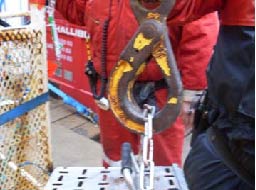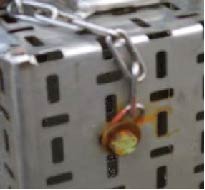Dropped object near-miss
A member has reported an incident in which an object was dropped whilst being lowered to divers on the seabed. The vessel was working in waters over 100m depth when a stainless steel toolbox was being ‘routinely’ deployed to divers on the seabed. The deployment of the toolbox was stopped at 98m (the short mark) and the divers were advised to retrieve it. However, on arrival at the pennant hook they reported the toolbox missing.
A search for the toolbox was made using an ROV and it was found on the seabed directly below the initial deployment point, from where it was recovered to deck. No one was injured and no equipment was damaged.
The incident was immediately reported to the offshore construction manager, who temporarily suspended operations. Initial inspection of the toolbox, the deployment pennant and hook onboard the vessel rigger did not identify any defects. However, the toolbox had been deployed by attaching it to the crane pennant hook by a section of long link chain bolted to the toolbox.
Investigation revealed that the small diameter long link chain had passed through the wear gap in the hook when the toolbox was transiting through the splash zone, allowing the toolbox to drop. The hook was certified and the wear was within design and wear specification limits.


The company noted the following:
- The incident had the potential to cause serious injury to divers and was reportable to local regulatory authorities;
- The incident happened during a ‘routine’ task where ‘custom and practice’ methods were accepted without challenge;
- The toolboxes were manufactured in-house and not fabricated to any design criteria or control processes. No engineering drawings were available;
- Important factors not considered during the fabrication of the toolboxes included:
- lifting accessory requirements
- effects of splash zone dynamics;
- There was no certification or safe working load of the lifting points or chain;
- The type of long link chain being used was unsuitable for deployment;
- Laying the chain over the throat of a hook was improper rigging practice;
- Neither the requirements of an existing risk assessment nor company control processes were complied with;
- Perception and awareness of the potential risks involved in this task was low:
- failure to recognise the toolbox as a lifting accessory
- failure to recognise that part of the lifting equipment was uncertified, not properly designed or fit for the purpose of lifting operations;
- Worksite safety culture was not fully effective:
- improper rigging practices employed
- deployment method not challenged by rigging team or worksite supervisors.
Safety Event
Published: 17 August 2009
Download: IMCA SF 12/09
IMCA Safety Flashes
Submit a Report
IMCA Safety Flashes summarise key safety matters and incidents, allowing lessons to be more easily learnt for the benefit of all. The effectiveness of the IMCA Safety Flash system depends on Members sharing information and so avoiding repeat incidents. Please consider adding safetyreports@imca-int.com to your internal distribution list for safety alerts or manually submitting information on incidents you consider may be relevant. All information is anonymised or sanitised, as appropriate.
IMCA’s store terms and conditions (https://www.imca-int.com/legal-notices/terms/) apply to all downloads from IMCA’s website, including this document.
IMCA makes every effort to ensure the accuracy and reliability of the data contained in the documents it publishes, but IMCA shall not be liable for any guidance and/or recommendation and/or statement herein contained. The information contained in this document does not fulfil or replace any individual’s or Member's legal, regulatory or other duties or obligations in respect of their operations. Individuals and Members remain solely responsible for the safe, lawful and proper conduct of their operations.
